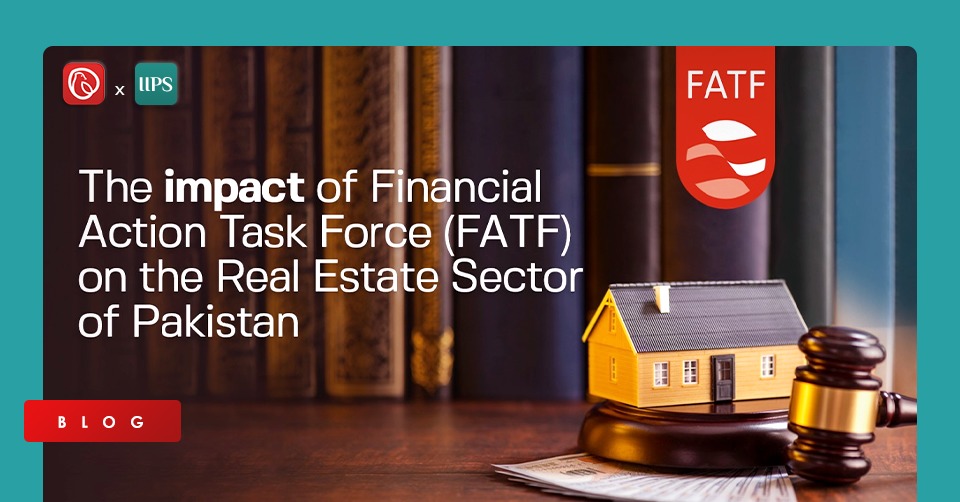
Recently, the Financial Action Task Force (FATF) announced its decision to keep Pakistan on its grey list but ruled out the possibility of blacklisting the country as it has met most of the conditions under the recommendation plan. In light of this development, the Federal Board of Revenue (FBR) has intensified inspections against Designated Non-Financial Businesses and Professions (DNFBPs). The FBR has also proposed strict penalties for real estate agents unwilling to comply with the anti-money laundering and counter-terror financing regime. The top revenue collecting authority plans to impose heavy fines on all real estate agents, advisors, and brokers who are reluctant to register themselves with the board of Designated Non-Financial Businesses and Professions (DNFBPs), which is an important requirement put forward by the FATF to get Pakistan off the grey list.
According to estimates, Pakistan’s real estate sector is worth USD 600-700 billion USD. If planned development accelerates in the country, real estate can become a multi-trillion-dollar sector. Although real estate is a national asset, it can be used for different financial crimes like money laundering, the whitewashing of money created through illegal sources, and the concealment of ill-gotten financial gains. Pakistan’s greylisting by the Financial Action Task Force (FATF) in 2018 set into motion several financial regulations by the government that involved streamlining major sectors of the economy. The FATF gave regular and updated recommendations to curb money laundering and counter-terror financing in the country. The recommendation plan has targeted several areas of the economy including the real estate sector, which lacks regulatory and financial transparency.
Pakistan’s real estate sector is largely unregulated and unplanned. Lack of rules, regulations, valuations, and planning has multiplied all sorts of administrative, socio-economic, and legal problems for the economy in general and the real estate sector in particular. Several loopholes in the regulation of the sector have resulted in its exploitation, making it a harbour of ill-gotten wealth. Real estate transactions and other processes in the sector are largely conducted off the record, which leads to under-invoicing of real estate assets and property. These practices disrupt proper documentation of real estate assets and boost non-transparent reporting. A lack of certified real estate agents, brokers and dealers has perpetuated this issue creating the potential for money laundering and terror financing activities.
Under the recent review of Pakistan’s efforts towards curbing money laundering and terror financing, the FATF announced that the country needs to demonstrate Designated Non-Financial Businesses and Professions, their monitoring for terrorist financing, and supervision commensurate with the risks. Under the Anti-Money Laundering Act, the FBR is responsible for ensuring that DNFBPs, which include real estate agents, dealers in precious metals and stones, and FBR-supervised accountants comply with anti-money laundering and counter financing of terrorism obligations. Currently, in Pakistan, out of the 500,000 property dealers and real estate investors/agents, only 22,000 are registered with DNFBPs. Thousands of unregistered real estate investors and property dealers continue to trade unregistered open files, affidavits, and certificates. Under this new regulation, registered real estate and property developers need to check the buyers and sellers’ names on the proscribed persons’ list by the United Nations. If the name of a potential buyer or seller is on the list, the developer or builder has to immediately report it to the concerned authorities.
Although the current government is currently obliged to implement the recommendations given by the FATF regarding the real estate sector, it needs a holistic and comprehensive plan to effectively regulate the sector in the long term. The real estate sector suffers largely from a lack of regulations and oversight from any proper authority. The implementation of a Real Estate Regulatory Authority (RERA) is a need of the hour. An overview of international best practices shows that majority of the countries with a mature and profitable real estate sector is governed by a competent regulatory authority. For instance, the real estate sector of Dubai has been able to attract millions of dollars’ worth of investment due to its streamlined and highly regulated real estate sector. The establishment of a real estate regulatory authority will increase transparency exponentially in every area of the real estate sector, from securing investments to the verification of property developers across the country.
ISLAMABAD: The Capital Development Authority (CDA) and the Asian Development Bank (ADB) have entered into…
Islamabad: The Capital Development Authority (CDA) has announced plans to issue possession letters to allottees…
Islamabad, [24 March 2025] – Graana.com, Pakistan's leading online real estate marketplace, is proud to…
Islamabad, Pakistan – March 2025: Graana.com, Pakistan’s leading real estate platform, has proudly partnered with…
KARACHI: Sindh Local Government Minister Saeed Ghani chaired a meeting on Monday to review measures…
ISLAMABAD: The Capital Development Authority (CDA) has unveiled plans to develop a modern food street…